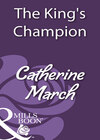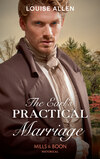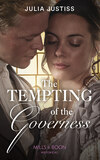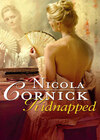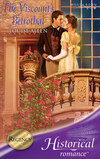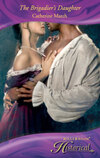Loe raamatut: «The King's Champion»
“Are you indeed a wanton,
Eleanor?” he demanded in
a rough voice.
“I did not mean—” she protested, but her words were cut short.
“I can see it in your eyes, as they follow me about the hall. Is this what you want?” Troye grasped her chin between his fingers and tipped her face up.
He lowered his head and his mouth came down on hers. His rough jaw scratched her tender skin, and she could smell and taste musky maleness laced with wine. Suddenly his hold loosened and his arms slid around her waist.
“I had forgotten,” he murmured, as he pressed his lips to her neck and for a moment breathed in the soft, sweet smell of her skin.
“What had you forgotten?”
“The feel of a woman.” His fingers smoothed down the curve of her back and she gave a little cry, her fingers clutching at his tunic. Troye realized her shock, that she had no experience of men, that this was no doubt her first real kiss, and cursed softly.
The King’s Champion
Harlequin® Historical
MILLS & BOON
Before you start reading, why not sign up?
Thank you for downloading this Mills & Boon book. If you want to hear about exclusive discounts, special offers and competitions, sign up to our email newsletter today!
Or simply visit
Mills & Boon emails are completely free to receive and you can unsubscribe at any time via the link in any email we send you.
Praise for Catherine March
“A good study of medieval England during William’s invasion, this tale will appeal to both genre fans and those looking for a bard-like tale of knightly love.”
—Romantic Times BOOKreviews on My Lady English
Author Note
During the years 1296–1305, Edward I mounted his first campaign to subdue Scotland and force Scottish loyalty to the crown of England. It was just the first of several campaigns over several decades. The events of this story are, therefore, only loosely based upon the events of the first campaign. The King’s Champion features characters you will have already met in The Knight’s Vow.
CATHERINE MARCH
THE KING’S CHAMPION

TORONTO • NEW YORK • LONDON
AMSTERDAM • PARIS • SYDNEY • HAMBURG
STOCKHOLM • ATHENS • TOKYO • MILAN • MADRID
PRAGUE • WARSAW • BUDAPEST • AUCKLAND
Available from Harlequin®Historical and CATHERINE MARCH
My Lady English #822
The Knight’s Vow #234
The King’s Champion #906
DON’T MISS THESE OTHER
NOVELS AVAILABLE NOW:
#903 THE DANGEROUS MR. RYDER—Louise Allen
He knows that escorting the haughty Grand Duchess of Maubourg to England will not be an easy task. But Jack Ryder, spy and adventurer, believes he is more than capable of managing Her Serene Highness. Join Louise Allen as she explores tangled love lives in her compelling miniseries THOSE SCANDALOUS RAVENHURSTS!
#904 THE GUNSLINGER’S UNTAMED BRIDE—Stacey Kayne
Juniper Barns has sought a secluded life as a lumbercamp sheriff to escape the ghosts of his past. He doesn’t need a woman sneaking into camp and causing turmoil…. Watch sparks fly as Juniper seeks to protect this vengeful beauty.
#905 A MOST UNCONVENTIONAL MATCH—Julia Justiss
Hal Waterman’s calling on the newly widowed Elizabeth Lowery is the caring act of a gentleman. He finds himself enchanted by the beautiful Elizabeth and her little son—although he knows he can never be part of this family….
Follow Hal’s emotional quest to win over Elizabeth’s heart in this long-awaited sequel to Julia Justiss’s The Wedding Gamble.
For the Quartermaster
With love
Contents
Prologue
Chapter One
Chapter Two
Chapter Three
Chapter Four
Chapter Five
Chapter Six
Chapter Seven
Chapter Eight
Chapter Nine
Chapter Ten
Chapter Eleven
Chapter Twelve
Chapter Thirteen
Chapter Fourteen
Epilogue
Prologue
Arundel Castle—20 April 1289
To celebrate spring the King had called a royal tourney. The scent of grass and apple trees bursting into blossom sweetened the air, welcome after the harsh and long winter. Yet their pastel hues of pink and cream paled in comparison to the bright colours of the hundreds of pavilions mushrooming across the meadows surrounding the castle. Some were of plain canvas, belonging to knights of lesser standing who hoped to win rich prizes and prestige with their skill at the joust, but most were striped in a varied combination of expensive colours, and on the lusty breeze heraldic banners waved from the topmost point of each pavilion.
The grounds were bustling with knights and squires, horses and heralds, strolling ladies and their lords, the noise of blacksmiths hammering at dented armour and cast shoes adding to the hubbub floating on the air. The sky spanned a cloudless blue above them and children romped in the sunshine, bursting with energy after many days confined indoors during the winter months.
Two knights sauntered, one very fair and the other dark, looking about with interest. They conversed earnestly upon the merits of their opponents, and occasionally commented on the several attractive filles de joie today present; they smiled politely at the former, with a small bow, and grinned broadly at the latter, with a brazen wink.
Their progress was hampered as two children suddenly burst from between a row of pavilions, striped in red and yellow and flying the banner of Lord Henry Raven of Ashton. The fair knight exclaimed and jumped back, clutching at his friend’s elbow in a warning gesture as two wooden swords chopped through the air.
‘Allez!’ shouted the one child, attacking the other with fierce swipes from side to side that greatly impressed the knights as they watched.
The children were dressed identically in linen tunics and chausses, cross-gartered, and the fiercest of the child-combatants had a blue scarf tied about his head. Although smaller than his opponent, he charged down boldly with lithe, graceful strides, swinging his sword with an accurate and controlled measure that soon had his opponent stumbling and crying, ‘Pax!’ as he fell to the ground. His opponent gave a war-like whoop of triumph and promptly sat upon his fallen victim, waving his sword in a circle and announcing his victory in a gleeful tone.
The two knights clapped and called out their admiration for such a fine display of young swordsmanship, and then the child turned and pointed a delicate chin over one shoulder, staring at them, with solemn cornflower-blue eyes.
‘Why, ’tis a girl!’ exclaimed the flaxen-haired knight.
‘Saints!’ His companion was equally amazed, ‘Have you ever seen the like, Austin?’
Dropping to one knee, Austin Stratford cupped her chin with gentle fingers. ‘Does your mother know what you are about, little maid?’
Without a blink of her very blue eyes she smacked his hand away with a sharp blow of her wooden sword. Austin exclaimed and leapt to his feet. He sucked his smarting knuckles whilst his friend looked on and made little attempt to smother a chuckle.
‘I pity the man who weds that little vixen,’ Troye de Valois stated with a taut smile.
‘I shall not wed!’ declared the little girl, swift and stout in her retort. ‘I shall fight in the tourneys and be champion of England, like my uncle.’
‘Indeed?’ Austin smiled, his eyes skimming over the perfect oval face, certain that one day she would grow into a great beauty and her fate would be otherwise. ‘And who is your uncle, if I might beg my lady’s pardon to ask?’
‘Ellie!’ groaned her defeated playmate, ‘let me up!’
The girl rose lithely to her feet and offered her hand to the boy, who huffed and moaned and dusted the back of his tunic with a great show. She turned sideways and eyed the two knights, who seemed very tall to her as she craned her little neck. The one was fair and had a laughing mouth, the other was very dark, his eyes more black than brown and his silence intimidating. There was a controlled tension about him that held a hint of menace. Quickly she looked away from him and addressed herself to his more amiable friend.
With great pride she puffed out her narrow chest and announced, ‘He is Remy St Leger, champion of England, and there is none who can best him.’
‘And you say he is your uncle?’ The two knights exchanged a glance.
‘Aye.’ She stood, leaning on one hip, her sword pointed down between her feet, clutching the hilt with her small hands, her very pose that of a young knight.
‘How old are you, little maid?’ asked Austin.
‘I shall be ten on St George’s Day.’
He asked gravely, a wary eye on the small hands clutching her wooden sword, ‘And why would a lady want to fight, rather than wed? ’Tis no easy task being a knight.’
She snorted derisively, her slim nose pointing to the sky as she scoffed, ‘’Tis boring being a lady! All they do is sew and eat sweetmeats and waste time on idle chatter. Why should I not participate in the joust? The German Hildegaarde something-or-other does, and there is a Turkish lady, I can’t ’member her name, she does too. And sometimes they beat the men, puny creatures that they are! Look how easily I beat Rupert. He’s my brother, you know, and two years older than me. And bigger.’
‘Shut up!’ Rupert cuffed her on the shoulder, his face flaring red.
Austin hid his amusement, and turned to his friend with a smile in his eyes.
Troye de Valois envied him his easy charm that enabled him to converse with everyone, whether they be kings or knights or ladies, or even little children. Making an effort, he stated in the boy’s defence, in his low, solemn voice that by nature held more a thread of steel than laughter, ‘Your brother is still a boy, but one day he will grow into a man. Men have much greater strength in their arms and shoulders than ladies do.’ He eyed her delicate bone structure and guessed that she would never develop the brawn of the German and the Turk. ‘Your female frame would never stand up to a man’s.’
She misheard him and declared indignantly, ‘I am not feeble!’
Troye backed away with hands upraised, as though in surrender to this fierce verbal assault, and Austin would have ruffled her hair had it not been bound up within the confines of her blue scarf, auburn tendrils escaping here and there. Instead he smiled and bowed to her, ‘I wish you good luck, my lady—’
‘Eleanor!’ a strident voice called. ‘Eleanor, where are you?’
‘Nurse!’ Eleanor and Rupert exclaimed in unison with round-eyed guilt, and together they ran off, scarce giving the two knights a backward glance.
The knights watched them go and then fell into step again, the feisty little girl-warrior soon forgotten as other matters claimed their attention. Troye intended to make his mark in the tourney, and he had both talent and courage enough to do so.
On the final day of the tournament he was drawn to ride against the famed Remy St Leger. As he waited for the signal to charge, and his horse pranced and champed against the firm rein checking him, he remembered the little girl and looked down the long length of the list. After a week of jousting it was dusty and the ground rough from the trampling of many hooves. At the far end sat St Leger on a big black Hanoverian stallion. His visor was down and he gleamed in silver-plate armour, big and solid as he sat firmly in the saddle. St Leger was thirty-four years old and Troye scarce five and twenty. By Troye’s reckoning he had been champion too long and now it was time to make way.
‘Laissez-aller!’ cried the Marshal, waving his banner that signalled they should charge.
Troye touched his spurs to his horse’s flanks and gripped the lance beneath his right arm tightly. The ground trembled as the two horses galloped at each other full tilt, and the crowd on either side of the lists held their breath. The two knights were well matched, each rock-steady in the saddle, their glance unwavering through the narrow slit of their visors as they thundered towards each other. A crash of wood on steel, the rendering split of a lance, and then the dull thud as a rider was sent crashing to the ground.
For a moment there was a stunned hush, and then a gasp of horror, as all eyes turned from the fallen champion, and stared at Troye de Valois. His few supporters cheered, but most were shocked. For the two knights, however, there was no regret on either side, only male acceptance of youth and that some things must come to an end if others were to have a beginning.
Troye was triumphant and gave a yell, shaking his clenched fist in the air, the adrenalin pumping fast through his veins and bunching his muscles with heady excitement. Yet later, at the end of the day, when he went to the King’s dais to collect his prize, Troye saw a little girl with long auburn hair clutching at the rails as she stood in the gallery above watching the proceedings. He recognised her and smiled, but she only stared solemnly back at him. She turned and ran to a blonde woman who could only be her mother, judging by the similarities in fine features and blue eyes, despite the startling difference in hair colouring that gave him a moment’s pause for doubt. Yet the child flung herself down in the vacant seat beside the woman and folded her arms across her little chest. Troye collected his gold ingot, his handsome features giving cause for many an admiring glance from the ladies in the stand. His own true love was many miles from London, and his vows to her he did not take lightly. Yet there was one female he cast his glance to—the maiden who would a knight be, and he bowed to her, smiling at her grudging little nod in salute of his victory, a gesture remarkably mature for one so young.
Ellie was devastated to see her uncle fall in the lists. She had felt the sting of tears at the back of her eyes, and yet they were staunched by her traitorous admiration for the knight who had this day proven himself the victor. He was very handsome indeed, very strong and bold and skilled at all forms of the art of combat. Ellie could not help but lose her heart to him. Soon they left Arundel and set off for home. Her uncle recovered quickly enough from his broken arm and bruised head, and her Aunt Beatrice announced her heartfelt relief that at long last her husband was ready to concede that his body was not as strong as his ego, and the time had come to retire.
Her father, Lord Henry Raven of Ashton, did not take them to tournaments again for a very long time, and when at the age of twelve Ellie experienced the changes that shaped her for womanhood, she put away her tunic and her wooden sword, at her mother’s insistence. She resigned herself to being a lady. She found other pursuits to enjoy, and as the years passed she found that it was not such a burden to be a lady. Indeed, she took great pleasure in dressing in becoming gowns of silk, of learning how to manage a household efficiently, and from her Aunt Beatrice she learned simple herbal remedies for everyday ills. Ellie greatly enjoyed listening to the tales told by travelling troubadours, tales of heroic deeds performed by handsome knights of exceptional courage and valour. None of them could compare to her Uncle Remy, of course. In her eyes he was the most handsome, and the most brave, of all knights in the kingdom, yet he was, after all, her uncle and he could not fill the space in her heart that yearned for love. A space that she had already assigned.
Her mother groomed her for her future life, which would be as wife to a knight of good standing and mother to his children, gently schooling her in the arts of being a lady and a woman. Ellie became aware that her face was considered to be beautiful and her slender form desirable. As she grew older she noticed that both had an effect upon the opposite sex, yet she felt that much was lacking in all the males of her domain. What Ellie wanted was a hero. A real man, a man of strength and honour and courage and valour, a man who had fought in battles and overcome all adversity, and who was not afraid to stand up and be counted, as in the troubadour’s tales. She knew of such a man, and over the years had heard his name mentioned many times. She was fourteen when she realised that all men must measure against the standard that was Troye de Valois.
Such a man did not exist in Ellie’s very small world, for most of the eligible knights had gone to Wales over the years to fight the King’s good fight, or now to Scotland as Edward sought to bring to heel the passionate and rebellious Scots. There remained at Castle Ashton, and in their neighbourhood, only young boys training as pages and priests; officials of the king’s new judicial system, sheriffs and reeves and judges; ancient men too worn and weary to climb into the saddle and resigned to a life as Lord Raven’s hearth knights. Perhaps if it had not been so, and she had met young knights in the usual way, she would not have clung to the image of Troye de Valois. She harboured him ardently within her heart, where neither logic nor absence could persuade her love to fail. She waited impatiently, anxious for Mother Nature to complete the nurturing process and for her body and her mind to emerge as a full-grown woman.
On his eighteenth birthday Rupert was selected to join the King’s Own Guard, serving as a cadet in the elite company of men guarding the king’s life with their own. Eleanor pointed out to her father that it was unfair that Rupert should have this advantage while she, a marriageable heiress, rusticated in the countryside. Her mother fully agreed that only at the court of King Edward would a suitable husband be found for their Eleanor and, at last, they made the journey to London that Ellie had dreamed of for many years. She was sixteen, and her greatest asset was not in the shine of her long auburn hair or the beauty of her face, nor the graceful shape of her figure, but the inner glow of love that shone from within. Her love for Troye de Valois had never ceased nor faltered over the years and, while her parents pondered on suitable bridegrooms, Ellie had no doubts about the man whom she wished to marry.
Chapter One
Cheapside, London—August 1295
Crowds of people had been waiting all morning for the procession that was now approaching, and a wave of cheering billowed on the warm morning air. The blast of trumpets vibrated on an elusive breeze, stirring dozens of colourful banners that adorned the stands on either side of the lists, and echoed in miniature by the pennons fastened on the end of the lances carried by the knights who would be competing in the tourney.
Resplendent in full armour, the knights gleamed silver-bright in the sunshine, helm-less that they might be seen by the adoring crowds, who had their well-loved favourites, and their loathlings. Above the noise of cheering, the jingle of harness and clop of many hooves upon the dusty road as they entered the stadium, there was also the sibilant hiss of jeering. It was well known that some knights won by ruthless methods other than skill, and whilst all knights must possess a brutal aggressiveness or lie slaughtered upon the field of battle, the manner in which it was applied was a matter hotly debated.
At the head of the procession rode the marshals and the constables, dressed in their frogged livery and full of smug satisfaction at their own importance, for it was they who would keep order, it was hoped, when male tempers raged hot and uncontrollable. Yet they were not held in adoration as the knights were, who each followed behind his own herald. At the forefront of the twenty knights invited to compete this week rode the champion of England, and the people’s darling—Troye de Valois.
His chestnut stallion danced, swinging his noble head as Troye held the reins with skilful yet casual ease. His dark hair had recently been cut short to the nape of his neck, so that in the hot summer sun he did not sweat unduly within his great helm. The crowd cheered even louder at his passing. Harlots hung from balconies and windows, eager to catch his attention. From their fingertips fluttered flower petals and ribbons cut from their chemises, for there was nothing more erotically alluring than a handsome man graced with a pair of broad shoulders and clothed in a masculine aura of strength, courage and danger.
Troye narrowed his eyes against the sun and the adulation, in equal measure. He had no doubts that once his rear end landed too often upon the dusty ground, he would be darling no more. At thirty-one he harboured no illusions about the younger men eager to bring about his downfall, and he smiled with rueful acknowledgement, waved his hand in salute, thanking the people of London for their praise, and yet prepared for their inevitable rejection.
Turning his horse into the stadium, he lined up with the other knights before the gallery of spectators, dominated by the King’s dais, bedecked and swagged with colourful bunting and garlands of ivy and ribbon rosettes. The sun slanted sideways, burnishing his deep tan and accentuating the hollow cheeks of his lean, handsome face.
In the stands, a fair-haired beautiful woman, Lady Joanna, called to her daughter, a smaller version of herself, with dark auburn hair tied back with silk ribbons.
‘Eleanor,’ her mother complained in a weary voice, ‘do stop jumping up and down and craning your neck like a swineherd. It is most unladylike.’
‘But I cannot see Rupert,’ Ellie responded, sitting down upon the bench and trying to peer through the dust and the glinting armour and the crowd of horses, with blushes and youthful awkwardness disguising her interest in one knight who was not her kin. And was he not the most handsome, the most strong, of all knights? Her heart glowed and fluttered as she gazed upon the face that been naught but a memory for so long.
‘He’ll be well to the back,’ said her father, reclining in his chair and leaning over to pick up her mother’s hand and kiss her knuckles.
Ellie rolled her eyes skywards, exasperated. Why couldn’t her parents be like normal people? They were for ever kissing and cosseting, much to her embarrassment.
‘What is that look for, demoiselle?’ demanded her father, with a small smile touching the corners of his mouth, ‘Your mother is worried. Might I not comfort her with a kiss?’
Ellie folded her arms over her waist and hunched her shoulders, looking away as she muttered, ‘In private, aye, but not here, where everyone can see.’
‘There is naught wrong with a little affection,’ rebuffed her father, and then added quickly, all too aware that his daughter was no longer a child, ‘between married couples, that is.’
Lady Joanna smiled at her husband, and murmured in her low, serene voice, ‘Leave her be, Hal. She chafes that it is her brother who rides in the joust and not herself.’
‘Hah!’ snorted Lord Henry, ‘that will be the day! ’Tis sport for men, not maidens, and you would do well to remember that, young Ellie.’
Ellie sighed. ‘Yes, Father.’ Her reply was dutiful and full of respect, for she had much love and admiration for her father, yet she burned and fretted against the restrictions of her sex, for more reasons than were apparently obvious. How she longed to run to Troye de Valois and throw her arms around his neck and tell him how much she loved him! Suddenly, unable to contain herself any longer, she leapt to her feet and pointed, with an excited shriek, ‘There he is!’ She ran to the rails and waved. ‘Rupert! Rupert!’
Her brother steadfastly ignored her, his eyes averted as the cavalcade rode by, exiting from the stadium, yet he felt a blush creep up his cheeks as the other knights made ribald comments about the pretty red-haired wench clamouring from the stands.
‘’Tis my sister,’ barked Rupert with a scowl, ‘so shut your mouths!’
This only brought forth more raucous crows and teasing quips, and some serious speculation that resulted in sudden overtures of friendship, in the hope of making an introduction to a wealthy young heiress who was not only of noble English blood, but beautiful too. Rupert, though only eighteen years old, had a sensible head on his young shoulders and was wise to their stratagems. What he knew of these knights, having fought and caroused alongside them all this summer past, in Scotland and Gascony, left him in no doubt that they fought hard, and played harder. The thought of such men making close acquaintance with his little sister somehow made him bristle and leap to protect her. Besides, it was not his say-so regarding Ellie—any honourable intentions must go through his father first.
While the knights retired to their arming tents in the field beyond, the crowd was entertained by the heralds, who gave eloquent, and often extravagant, introductions, relaying to all and sundry not only their master’s name and country of origin, but his ancestry, heraldic banner, victories and character. Only knighted nobles were allowed to participate in the joust and this was part of the glamour that attracted the commonfolk: for them the knights were men not of their ilk, but demigods—stronger, faster, braver than any mere mortal man—or so they wished to believe.
Ellie sat bored and fidgeting, fanning herself in the sultry afternoon heat while the speeches droned on, sucking on a lemon sherbet that too quickly melted and left her with sticky hands. She was desperately eager to see Rupert and speak with him, remind him to keep his guard steady and not to look away too soon, naïvely convinced that without her advice he would fail. Conveniently she forgot that so far he had survived quite well without her. This was his first summer on the tournament circuit, and it had taken some persuading to convince her mother to make the journey to London to watch him compete. Lady Joanna had not wanted Rupert to participate in the joust in the first place, and sought to avoid the spectacle of her son being attacked at all cost. Yet she had been worn down by the pleadings of her husband and her daughter and had seen the necessity and opportunity of making a suitable match for Eleanor amongst the great gathering of nobility.
On Ellie’s other side sat her Aunt Beatrice, her dark hair streaked with silver and yet her brown eyes and soft skin still beautiful despite her middling years. ‘Shall I go and find Uncle Remy for you?’ asked Eleanor artfully, seeing how her aunt darted frequent and worried looks to the entrance.
‘Nay…’ Lady Beatrice patted her hand ‘…he will be in the arming tent giving Rupert some last-minute advice, no doubt, and ’tis no fit place for a lady. He will be here anon.’
Ellie pursed her lips in frustration, and slumped inelegantly on the bench, disgruntled with her lot in life and earning a reprimand from her mother, who was ever mindful of the fact that beautiful, unmarried and privileged girls like Eleanor were constantly watched and appraised.
Ellie was roused from her maudlin mood when a blast of trumpets heralded the first joust of the day. At this stage of the tournament it was the young, inexperienced knights who rode first, and Rupert was amongst them. Eleanor looked up as a pair of boots pounded on the wooden steps and along the narrow gangway of the gallery. Her Uncle Remy ran lithely to where they sat, casting a smile on his wife as he sat down, and leaning forwards to reassure Lady Joanna that all would be well for Rupert.
‘Did you tell him to keep his guard up?’ asked Eleanor urgently. ‘He tends to look away too soon.’
‘Aye,’ laughed her uncle, his blue eyes bright with a teasing glint. ‘Don’t fret, little one, he is a man full grown and this is not his first joust.’
‘Though ’tis the first I have watched,’ complained Lady Joanna, her lips pinched white in a worried grimace.
When at last Rupert brought his caparisoned charger on to the field and faced his opponent, it was his sister who leapt to her feet, shouting encouragement along with the commonfolk who cheered from the far side of the lists. Until, that is, her mother gripped her wrist and jerked her down, with a swift admonishment to sit still and be quiet. Her father and her uncle laughed, and then they too were leaping to their feet and shouting as the ground thundered to the pounding of galloping hooves and the air vibrated with rowdy cheering.
Rupert was drawn three times in the list, and three times he vanquished. As the sun dipped in the afternoon sky and the joust came to an end at seven in the evening, there was much rejoicing in the Ashton camp. Ellie and her family retired to their pavilions, pitched in the meadows beyond Cheapside. It was inexpensive and convenient accommodation, compared to the taverns of London that were infested with disease and thieves, but still it lacked in homely comforts. Lady Joanna and Lady Beatrice supervised the boiling of hot water and the cooking of supper upon vast cast-iron cauldrons set on open fires. Rupert had his own tent amongst the competing knights, on the far side of the same crowded meadow. Ellie endeavoured to slip away and to rush to her brother, eager to hear from his own lips how it had felt to be victor three times today, and eager to have news of Troye de Valois.
It was no easy task and was full dark by the time she managed to make the feeble excuse of visiting the privy, and then change her course for the knights’ encampment. The cool evening air and the darkness threw a cloak over the field that in daylight she had few qualms about traversing. Now she trod warily, leaving behind her the comforting domestic noise of clattering spoons and gossiping serfs, to encounter the coarse laughter and strident music of the revelling knights. This was a foreign world, and Ellie feared her father’s wrath should he find out where she had been. She picked up her pace and jogged her way between the striped pavilions, but in the dark and the dancing shadows thrown by the flames of open fires she felt disorientated and struggled to locate Rupert’s tent.
Tasuta katkend on lõppenud.
